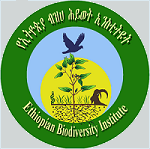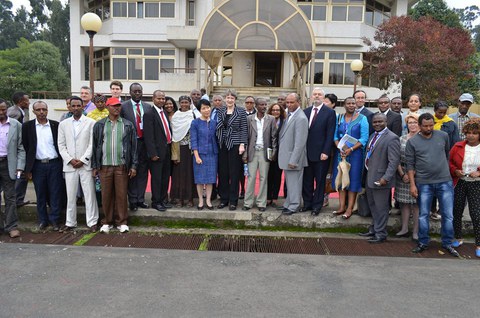 “Investing in the wellbeing of our planet and halting climate change should not be seen as a ‘cost’, but as a worthwhile investment,”
“Investing in the wellbeing of our planet and halting climate change should not be seen as a ‘cost’, but as a worthwhile investment,”
|
“Investing in the wellbeing of our planet and halting climate change should not be seen as a ‘cost’, but as a worthwhile investment,” Helen Clark United Nations Development Program (UNDP) Administrator |
|
|
On the occasion of third International conference on Financing for development, United Nations Development Program (UNDP) Administrator, Helen Clark and the Global Environment Facility’s (GEF) Chief Executive Officer, Dr. Naoko Ishii visited Africa’s largest gene bank hosted by Ethiopian Biodiversity Institute (EBI), an initiative that links scientists with small-scale farmers to collectively revive and conserve traditional, indigenous seeds in the face of drought, climate change and progressive erosion of traditional agricultural varieties that will prove vital for the future of food security in Africa. |
|
|
|
Dr. Gemedo Dalle, EBI director general, said on the opening speech of the briefing, “It is indeed a great pleasure and honor for me to welcome to a country that is both origin and center of agrobiodiversity. He also said “Ethiopia is among the few countries in the world for the on farm conservation of farmers’ varieties. We are grateful to the UNDP and GEF for both financial and technical supports in realizing exemplary imitative that has directly and positively contributed to improve the livelihood of the local farmers also ensured conservation and sustainable utilization of our agrobiodiversity.” Dr. Eleni Shiferaw, Characterization, Multiplication and Regeneration Case Team Leader, explained the activities and achievements of the projects supported by UNDP & GEF during the presentation session. The invited farmers have given their own witness they are having from the projects. “We need to make smart decisions and leverage environmental finance to catalyze and deliver multiple economic, social and environmental benefits. Investing in the wellbeing of our planet and halting climate change should not be seen as a ‘cost’, but as a worthwhile investment,” Helen Clark said during the reflection session. |
|
The gene bank is a repository where biological material is collected, stored, catalogued made available for redistribution. It also contributes to food security by maintaining a diverse gene pool in the form of crop varieties and by distributing seed to communities highly affected by climate change, droughts and connected chronic food shortages. “The need for development will always outstrip the resource available, so we have to find the opportunities to catalyze change and snowball into impacts far in the future,” Dr. Naoko Ishii said. “When we don’t protect our natural capital we often are eating into the resources of the poor and vulnerable in society. |
|
|
Marie Haga, Global Crop Diversity Trust (GCDT), Executive Director, said “What EBI is conserving in the gene bank is the food that the World need for the future generation. So, what I have seen today is really amazing for me.” Ethiopia has established 21 community gene banks in which 15 different crop species and 19 farmers’ verities are currently conserved on farm. Over the past decades, EBI has managed to conserve more than 77,167 accessions of 489 species of plants in its gene bank. |
|
| Release date | 09/08/2016 |
|---|---|
| Contributor | IT Team EBI |
| Geographical coverage | planet,halting climate change, investment |
| Keywords | planet,halting climate change, investment |
Please note that this information has expired.



